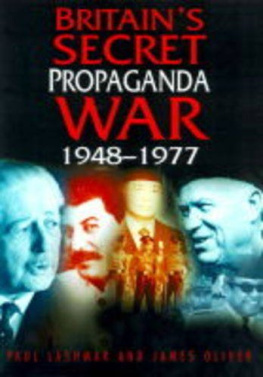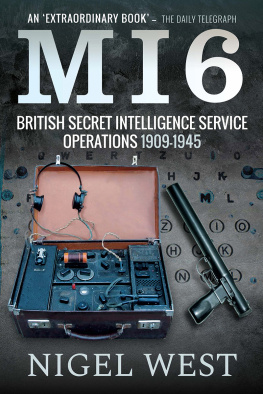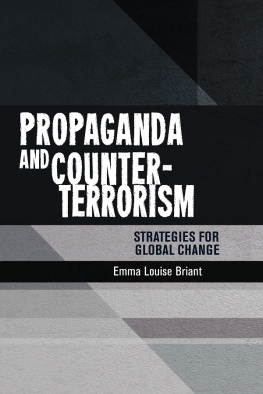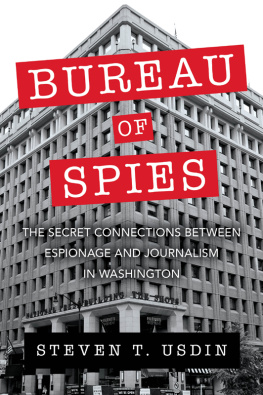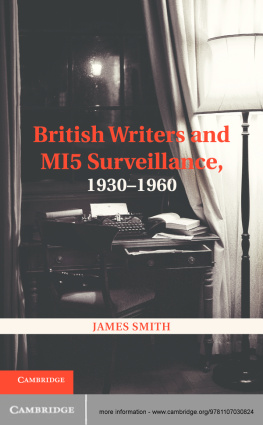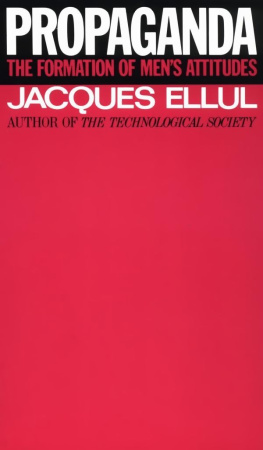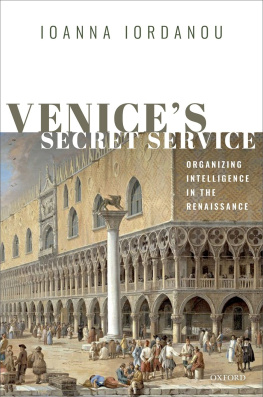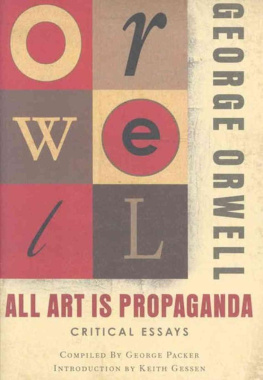Acknowledgements
This book could never have happened without the help of Richard Fletcher. His work on IRD was the inspiration, and without his voluminous files there would have been no book.
In addition we should like to thank Richard Aldrich, Nick Anning, Brian Brivati, Duncan Campbell, Susan L. Carruthers, Mary Carson, David Chipp, Mark Curtis, Phillip Deery, Steve Dorrill, Gen Sir Anthony Farrar-Hockley, Phil Kelly, Dianne Kirby, David Leigh, Scott Lucas, Tom McCarthy, Katherine Murray, Greg Neale, Michael Nelson, Richard Norton Taylor, Richard Oliver, Hugh O'Shaughnessy, Robin Ramsay, Gary D. Rawnsley, Andrew Roth, John Savile, Ramesh Sharma, Tony Shaw, Sue Steward, Andy Weir, Hugh Wilford, and the many others who assisted us in one way or another.
In the United States, thanks go to Scott Armstrong, John Jenks, Kathy Kadane, Ralph McGhee and Lou Wolf.
We also appreciated those who gave us time for interviews on the record, including Sir Richard Body, Roland Challis, John Cloake, Brian Crozier, Col Dodds-Parker, Fred Emery, Michael Ivens, Hugh Lunghi, Lord Mayhew, Lord Owen, Norman Reddaway, Geoffrey Tucker, Hunter Wade, Colin Wallace, J.H.A. Watson, Fay Weldon, Ernest Wistrich, Sir Oliver Wright, and those former members of the IRD who gave us off-the-record interviews.
We should also like to thank Phillip Whitehead of Brook-Lapping.
Introduction
In early 1972, Richard Fletcher noticed an odd advertisement in the Guardian that raised his suspicions. Fletcher, a long-standing Labour Party activist and occasional investigative journalist, was engaged at the time in a major inquiry for the Sunday Times into the CIA's (Central Intelligence Agency) subversion of the British Labour Movement. This inquiry revealed that the CIA had extensively funded British politicians and trade unionists of a 'moderate' and anti-Communist stance and had helped overthrow leftist leaders in British dependencies. Fletcher's research had also revealed that the CIA had covertly funded anti-Communist publishing. The Guardian advert, Fletcher had noticed, was for a bibliography, Books on Communism, written by one R.N. Carew Hunt of St Antony's College, Oxford. Fletcher was well aware of St Antony's close links with US and British intelligence. 'I also knew that it was not financially viable to publish books on such a boring subject as Communism. I suspected the book was subsidized in some way,' he said.
As part of their CIA investigation, one of Fletcher's team went to Companies House and checked out the accounts of the book's obscure publisher, Ampersand Ltd. These showed that the company had been set up in 1946 by one Leslie Sheridan, 'a public relations consultant'. On the surface, everything indicated an ordinary small publishing house, but the accounts had some odd features. There appeared to be little business activity the company had few expenses in the way of postage or telephone calls. More significantly, it seemed to make negligible profit from sales. Costs, however, were met exactly by an unidentified donor. 'It looked to me as though it was another CIA publishing front,' said Fletcher. He put any further investigation on the backburner while he concentrated on other stories. It was not until 1976 that events led him to look at Ampersand again.
In London in the mid-1970s British intelligence was shaken to the core by the intensity of the light being shone on its Atlantic cousins. In November 1976 the Labour Home Secretary, Merlyn Rees, announced that on the advice of his security advisers he intended to deport two Britain-based Americans who had been active in bringing the CIA to account. One was Phillip Agee, a former CIA officer whose revelatory book, Inside the Company, had become a bestseller. The other, Mark Hosenball, was an American journalist who was working for the Evening Standard.
Rees claimed that these men posed 'a danger to national security', without giving details. Support for the two men was mobilized from the radical left, still vibrant from the heady days of 1968. A campaign was launched to stop the deportations. The campaigners set out to publicize evidence of the CIA's malevolent involvement in the domestic politics of many countries friendly to the US. Richard Fletcher was a founder of the Agree Hosenball campaign. An ad hoc group of journalists and students assembled round him to help him to reveal more of the hidden activities of the CIA.
Fletcher asked Richard Oliver, at the time a research assistant at North London Polytechnic, to follow up the lead on the mysterious anti-Communist publisher Ampersand. The assumption was that the company's founder, Leslie Sheridan, was working as a front for the Americans either the CIA or some other linked organization. Oliver set out to St Martin's Lane Reference Library, near Leicester Square, to find out more about the company and its directors. A few hours later, Fletcher received an excited phone call from Oliver: 'It must be British!' He had unearthed Leslie Sheridan's obituary in The Times. Although cautiously written, the obituary revealed that Sheridan had worked for the British wartime propaganda organization the Political Warfare Executive (PWE). 'It was fascinating to watch the sureness of his professional approach on a subject like propaganda', the obituary said. After the war, it continued, Sheridan had 'carved himself a new career in the difficult field of public relations and later in an advisory capacity to the Foreign Office'. In addition, Fletcher and Oliver discovered that another of the directors of Ampersand was a wartime MI5 officer; this had to mean that the company was a British, not an American, front.
Next Fletcher located and contacted Sheridan's widow, Caroline. Although guarded, she told him that a Foreign Office section called the Information Research Department (IRD) was central to her husband's work. She suggested that Fletcher should talk to a former colleague of Leslie Sheridan's called Adelaide Maturin. She did not mention that Maturin was Sheridan's previous wife or that Maturin had become an MI6 career officer after the war. Unsurprisingly, Maturin, now retired to the country, declined to talk with Fletcher.
Fletcher's team, though, had been back to Companies House and noticed that Ampersand was linked to a range of other odd companies through its solicitor, Victor Cannon-Brookes. Over the next months the team unravelled a vast array of interlocking companies and establishment directors for a range of publishing and news agency companies. Interviews with well-placed intelligence sources had by now revealed that the Foreign Office's IRD was a secret anti-Communist propaganda organization, closely linked to MI6 and with a wide web of journalist contacts. The individual companies pieced together at Companies House were part of a global network of media organizations jointly run by IRD and MI6 over a thirty-year period. Bolstered by a growing pile of hard evidence, the team took its discoveries to the Observer, where they were published early in 1978 as 'How the Foreign Office Waged Secret Propaganda War', bylined Richard Fletcher, Phil Kelly, Paul Lashmar, Tony Smart and Richard Oliver
A day earlier a Guardian article by investigative reporter David Leigh revealed that Foreign Secretary David Owen had closed down IRD a few months before for unspecified reasons. Leigh had been tipped off about IRD by a Foreign Office insider. Since those first revelations were published, further details of IRD's activities have gradually trickled out in the media over the last twenty years. Every year or two another article has popped up in the press revealing some new facet of IRD. Many featured George Orwell's curious relationship with the department. Strangely, interest in IRD has grown rather than declined. This is, in part, a reflection of widening appreciation of the enormous impact that its covert operations had over the years.

